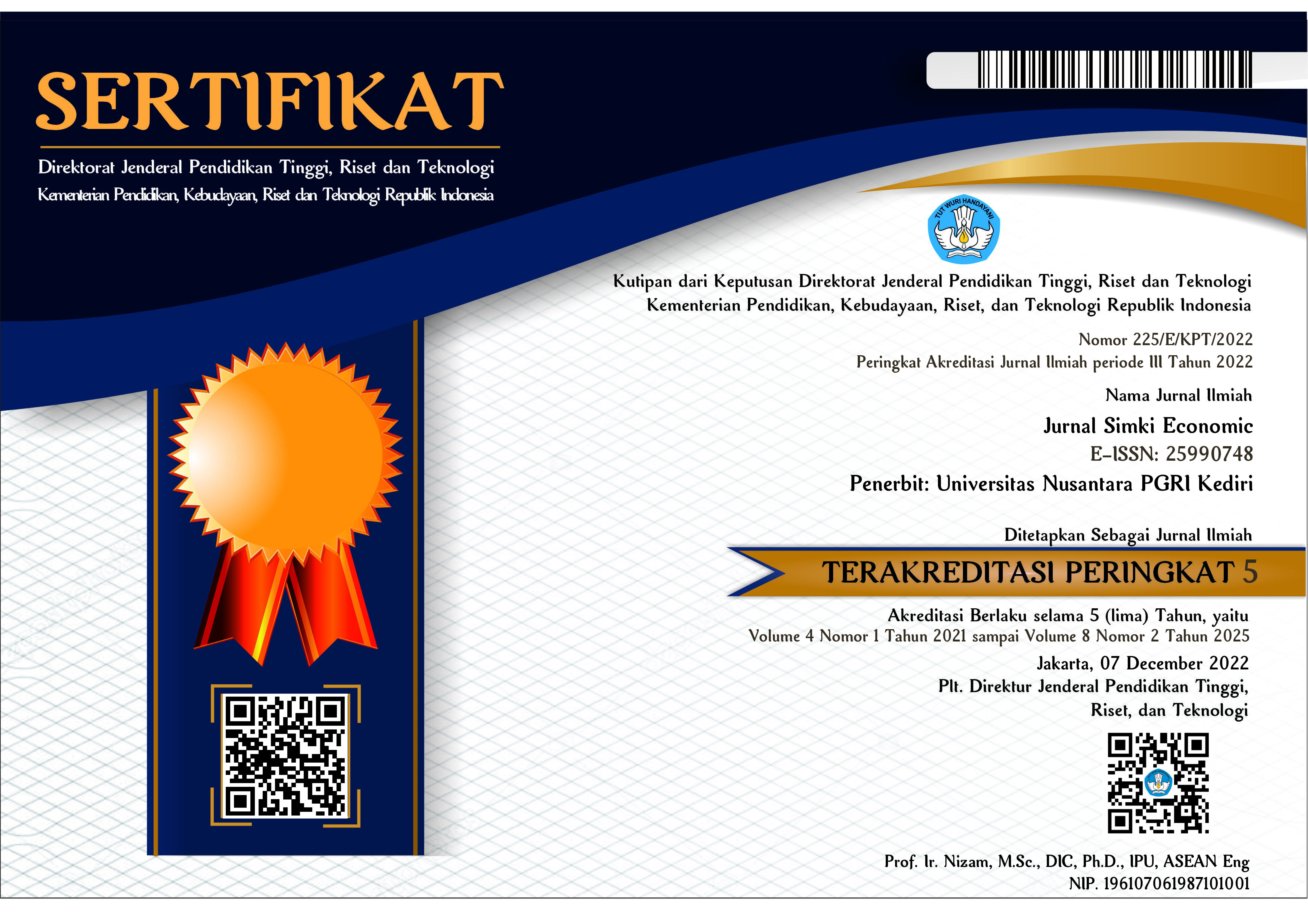Enhanching Environmental Performance (EP) through Green Organizational Culture (GOC) and Green Transformational Leadership (GTL) with Workplace Pro-Environmental Behaviour (WPEB) as Mediating Variable
 Abstract views: 231
,
Abstract views: 231
,
 PDF downloads: 132
PDF downloads: 132
Abstract
The purpose of this study is to investigate the impact of Green Organizational Culture (GOC), Green Transformational Leadership (GTL), and Workplace Pro-Environmental Behaviour (WPEB) on Environmental Performance (EP) at Batik MSMEs in Semarang. A sample of 100 respondents was selected from a population of 331 employees at 117 MSMEs, selected through purposive sampling. The research focused on MSMEs that produce batik from raw materials to finished goods. Data analysis using SPSS version 25 with a significance of 5%. The findings indicate that Environmental Performance (EP) is significantly impacted by Green Organizational Culture (GOC), Green Transformational Leadership (GTL), and Workplace Pro-Environmental Behavior (WPEB). Green Organizational Culture (GOC) and Green Transformational Leadership (GTL) also affect Workplace Pro-Environmental Behaviour (WPEB). The relationship between the two variables and Environmental Performance (EP) was found to be mediated by Workplace Pro-Environmental Behavior (WPEB). The limitation of the study lies in the scope of the population, where out of 117 MSMEs only about 15 actually function as batik producers. Future research is recommended to add other variables Private Life, Environmental Awareness, Green Mindfulness, Pro-Environmental Identity, and expand the scope of objects so that the results are more representative.
Downloads
References
Aggarwal, P., & Agarwala, T. (2023). Relationship of green human resource management with environmental performance: mediating effect of green organizational culture. Benchmarking, 30(7), 2351–2376. https://doi.org/10.1108/BIJ-08-2021-0474
Ahmad, J., Al Mamun, A., Masukujjaman, M., Mohamed Makhbul, Z. K., & Mohd Ali, K. A. (2023). Modeling the workplace pro-environmental behavior through green human resource management and organizational culture: Evidence from an emerging economy. Heliyon, 9(9). https://doi.org/10.1016/j.heliyon.2023.e19134
Bass, B. M., & Bass Bernard, M. (1985). Leadership and performance beyond expectations.
Chandra, K., Arafah, W., & Basri, Y. Z. (2021). Analysis of the Effect of Green Organizational Culture on Organizational Performance and Competitive Advantages of Green through Green Innovation in Manufacturing Industries. Journal of Hunan University Natural Sciences). (Vol. 48, Issue 6). https://www.jonuns.com/index.php/journal/article/view/596
Chen, Y. S., & Chang, C. H. (2013). The Determinants of Green Product Development Performance: Green Dynamic Capabilities, Green Transformational Leadership, and Green Creativity. Journal of Business Ethics, 116(1), 107–119. https://doi.org/10.1007/s10551-012-1452-x
Claver-Cortés, E., Molina-Azorín, J. F., Pereira-Moliner, J., & López-Gamero, M. D. (2007). Environmental strategies and their impact on hotel performance. Journal of Sustainable Tourism, 15(6), 663–679. https://doi.org/10.2167/jost640.0
Daily, B. F., Bishop, J. W., & Massoud, J. A. (2012). The role of training and empowerment in environmental performance: A study of the Mexican maquiladora industry. International Journal of Operations and Production Management, 32(5), 631–647. https://doi.org/10.1108/01443571211226524
Galpin, T., Whittington, J. L., & Bell, G. (2015). Is your sustainability strategy sustainable? Creating a culture of sustainability. Corporate Governance (Bingley), 15(1), 1–17. https://doi.org/10.1108/CG-01-2013-0004
Govindarajulu, N., & Daily, B. F. (2004). Motivating employees for environmental improvement. Industrial Management and Data Systems, 104(3), 364–372. https://doi.org/10.1108/02635570410530775
Kaiser, F. G., Oerke, B., & Bogner, F. X. (2007). Behavior-based environmental attitude: Development of an instrument for adolescents. Journal of Environmental Psychology, 27(3), 242–251. https://doi.org/10.1016/j.jenvp.2007.06.004
Nawangsari, L. C. (2019). Pengaruh Green Transformational Leadership dan Green Training Terhadap Sustainable Corporate Performance Melalui Employee Green Behaviour: Pendekatan Konsep. Seminar Nasional Peningkatan Mutu Perguruan Tinggi, 219–226. https://publikasi.mercubuana.ac.id/index.php/snpmpt/article/view/7963
Nurulfadhilah, L., & Emilisa, N. (2022). Pengaruh GHRM, Task-Related Pro-Environmental Behavior, Proactive Pro-Environmental Behavior, Green Innovation Practices Terhadap Environmental Performance. Cakrawala Repositori IMWI, 5(2), 312–331. https://www.cakrawala.imwi.ac.id/index.php/cakrawala/article/view/135
Schein, E. H. (2010). Organizational culture and leadership. www.josseybass.com
Sroufe, R. P., & Melnyk, S. A. (1998). Environmental Management Systems As A Source of Competitive Advantage.
Steg, L., & Vlek, C. (2009). Encouraging pro-environmental behaviour: An integrative review and research agenda. Journal of Environmental Psychology, 29(3), 309–317. https://doi.org/10.1016/j.jenvp.2008.10.004
Sugiyono, D. (2013). Metode penelitian pendidikan pendekatan kuantitatif, kualitatif dan R&D.
Suratno, I. B., Darsono, D., & Mutmainah, S. (2007). Pengaruh Environmental Performance Terhadap Environmental Disclosure dan Economic Performance (Studi Empiris pada Perusahaan Manufaktur yang terdaftar di BEJ Periode 2001-2004). The Indonesian Journal of Accounting Research, 10(2). https://ijar-iaikapd.or.id/index.php/ijar/article/view/174
Zhao, W., & Huang, L. (2022). The impact of green transformational leadership, green HRM, green innovation and organizational support on the sustainable business performance: evidence from China. Economic Research-Ekonomska Istrazivanja , 35(1), 6121–6141. https://doi.org/10.1080/1331677X.2022.2047086
Copyright (c) 2025 Anggit Waskita Nugraha, Siti Sumiati

This work is licensed under a Creative Commons Attribution 4.0 International License.














